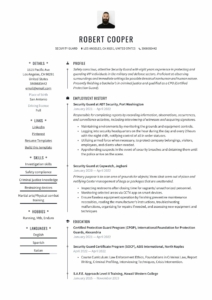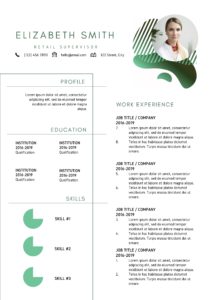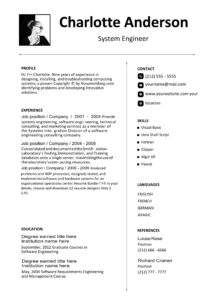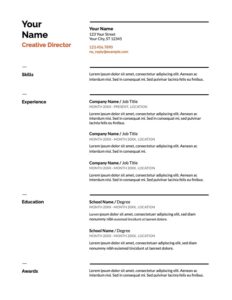
Are you looking for a job as a Property Manager? You have come to the right place. Have a look at our stellar Property Manager resume samples below for a bit of inspiration. We have also created a write-up with tricks, tips, and advice to help you compile a superb resume that will stand out from the rest of the applications by a mile.
In a nutshell, the purpose of a Property Manager role is to facilitate and manage the engagement between tenants and landlords, and remove the administrative burden for both parties.
However, numerous action items lead to fulfilling your purpose as a Property Manager, and that is where we come in. In the paragraphs below, you will learn, for example, what the layout of your resume should look like, how to your document into the appropriate sections that recruiters will look at, how to create accomplishment statements, and ensuring your skills section is ATS proof by using a Resume SEO strategy.
What you can read in this article
18 Property Manager Resume Examples
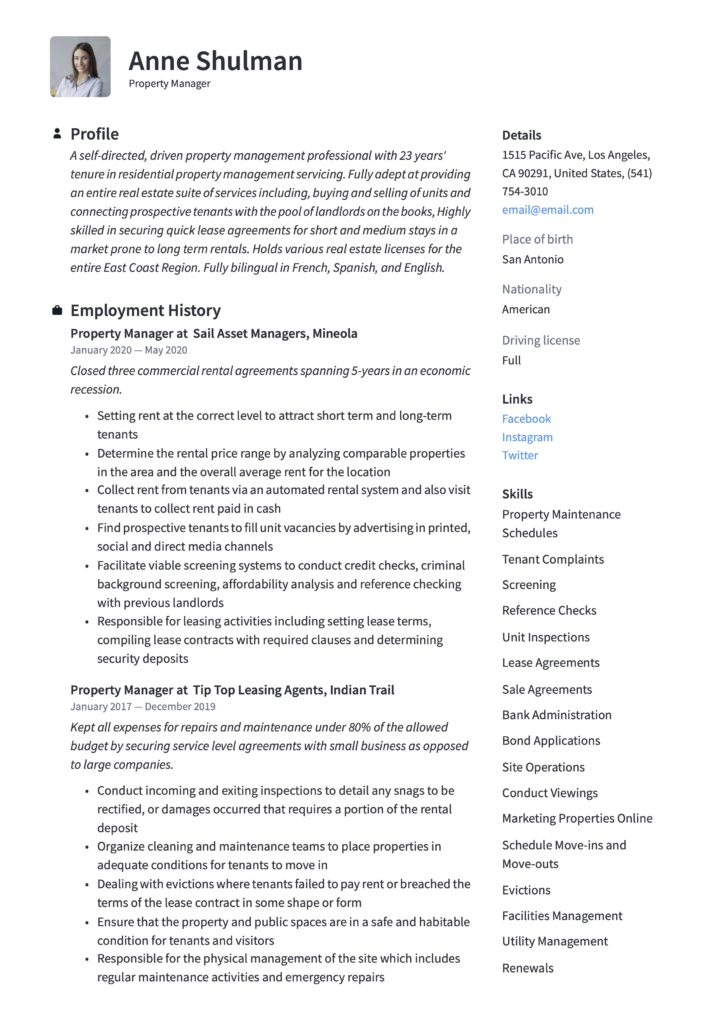
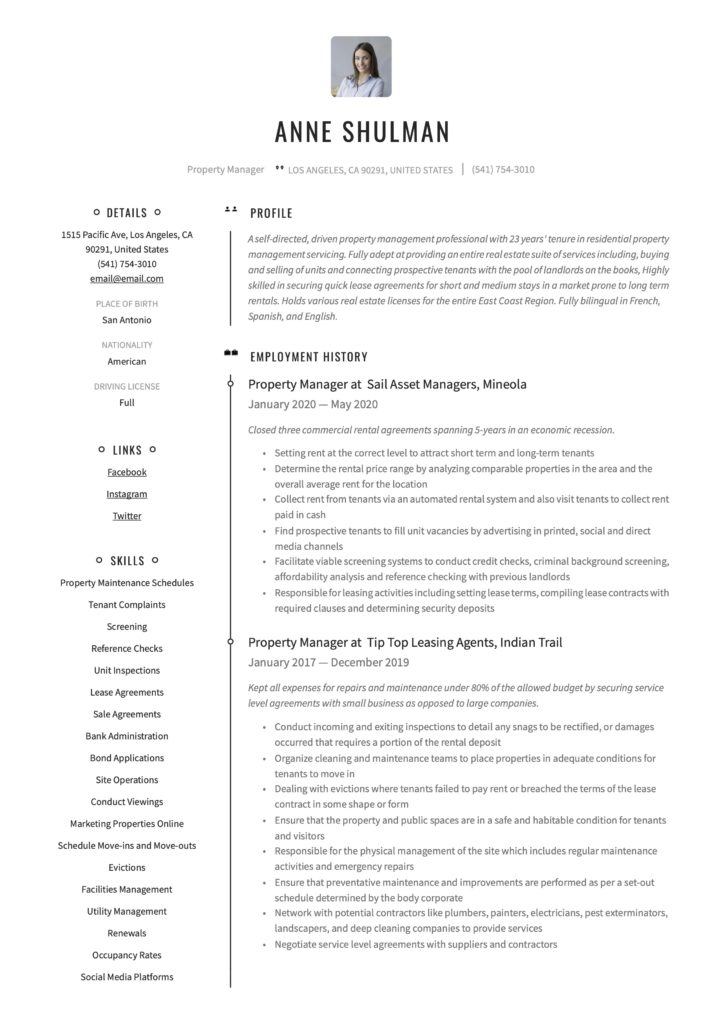
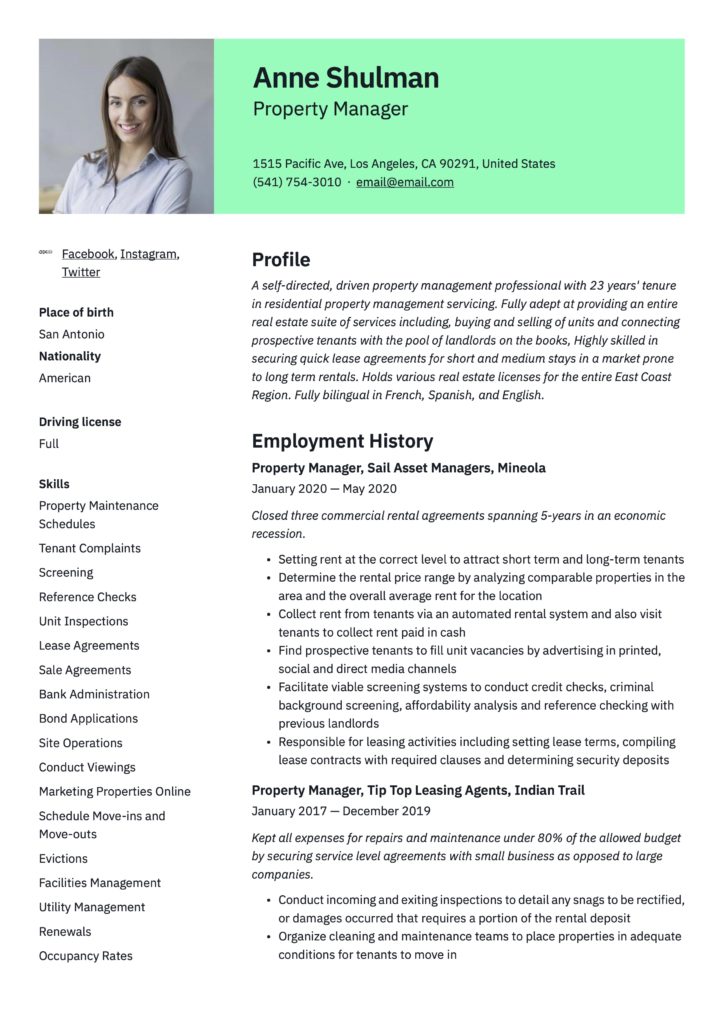

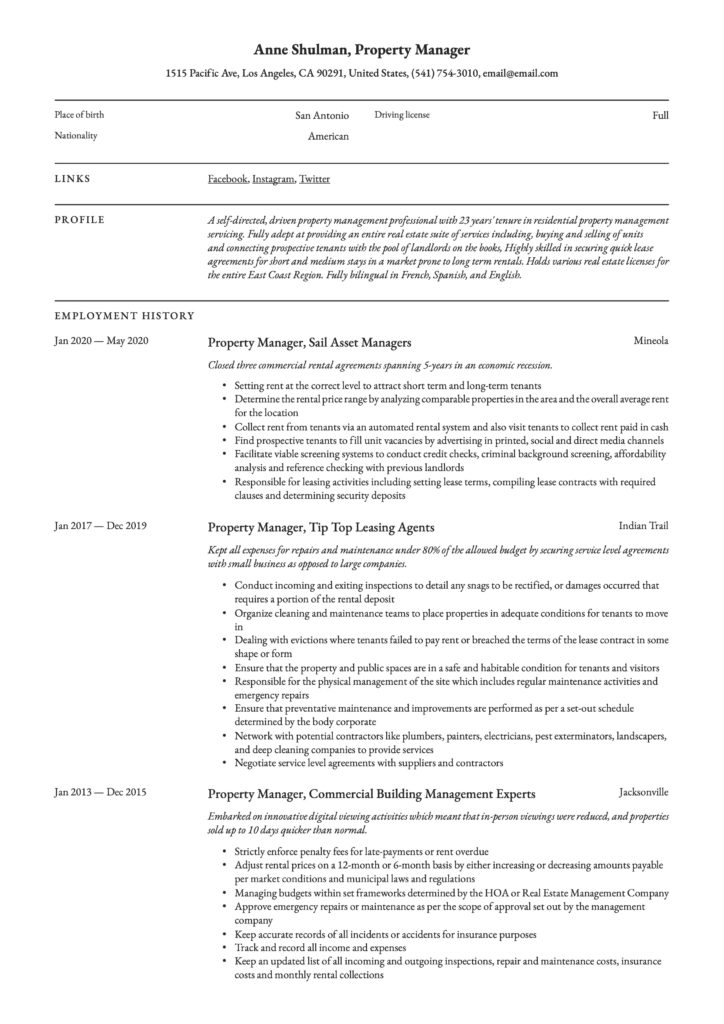
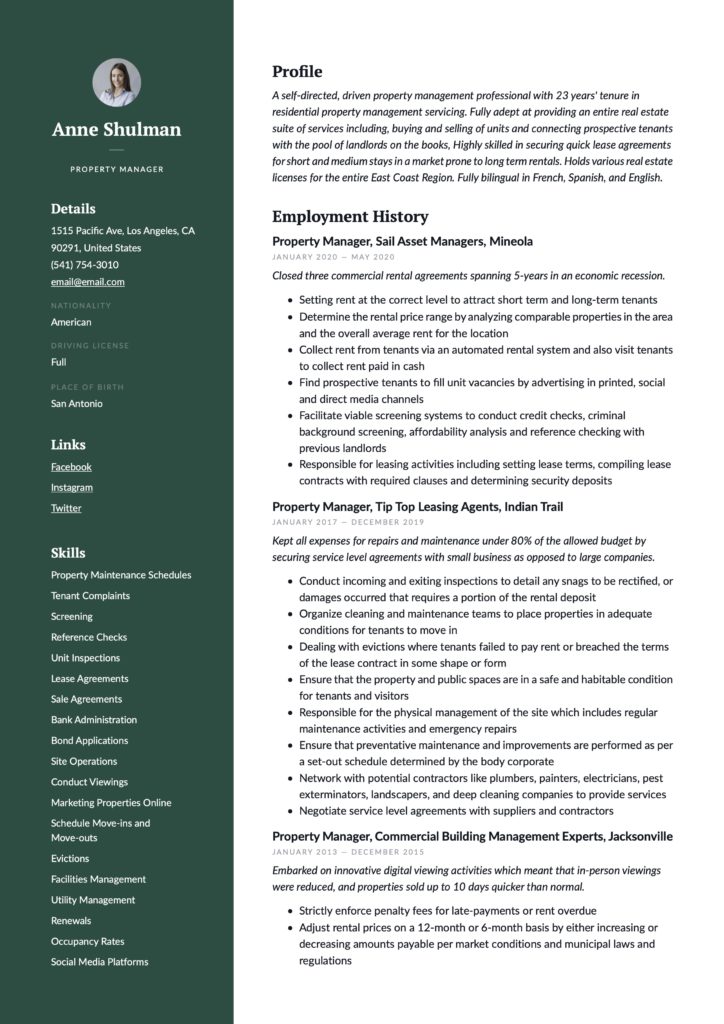
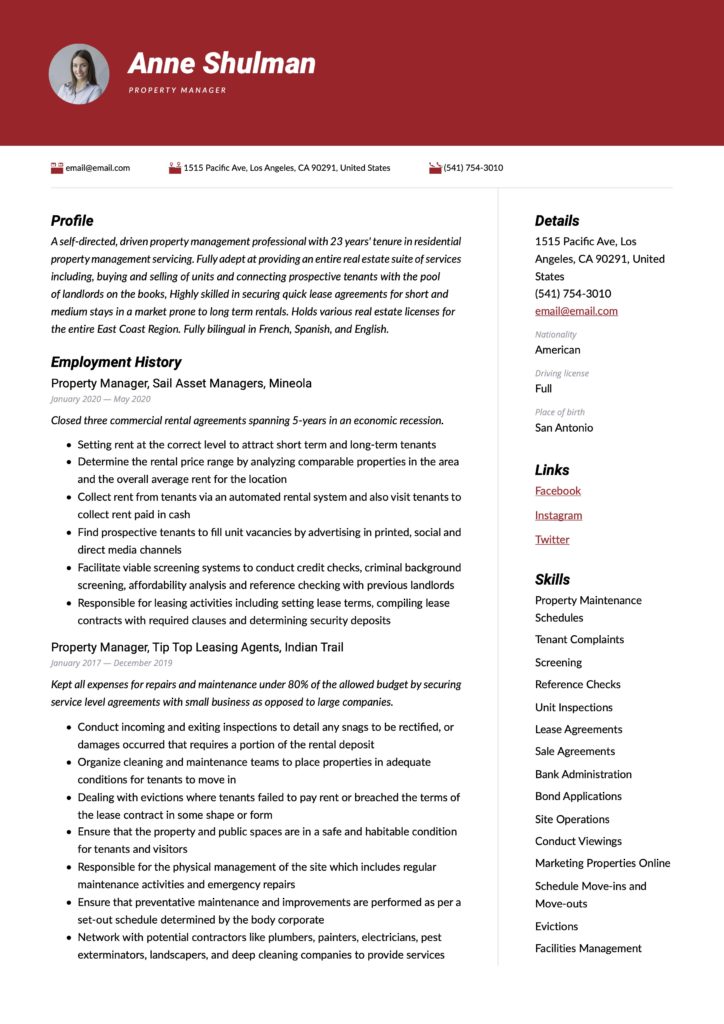
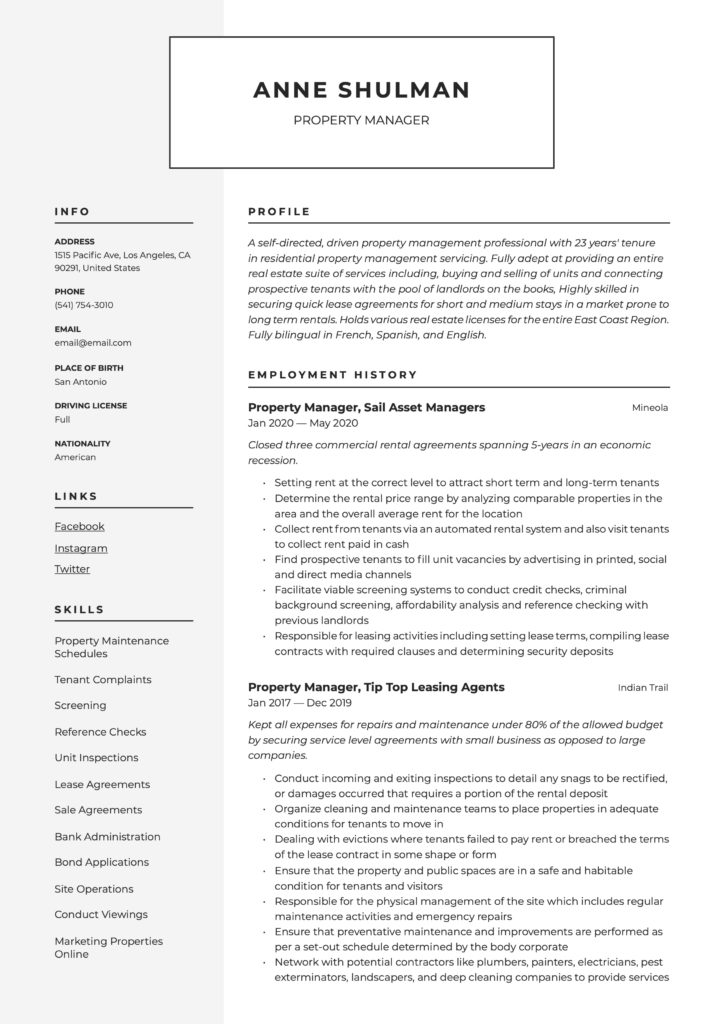
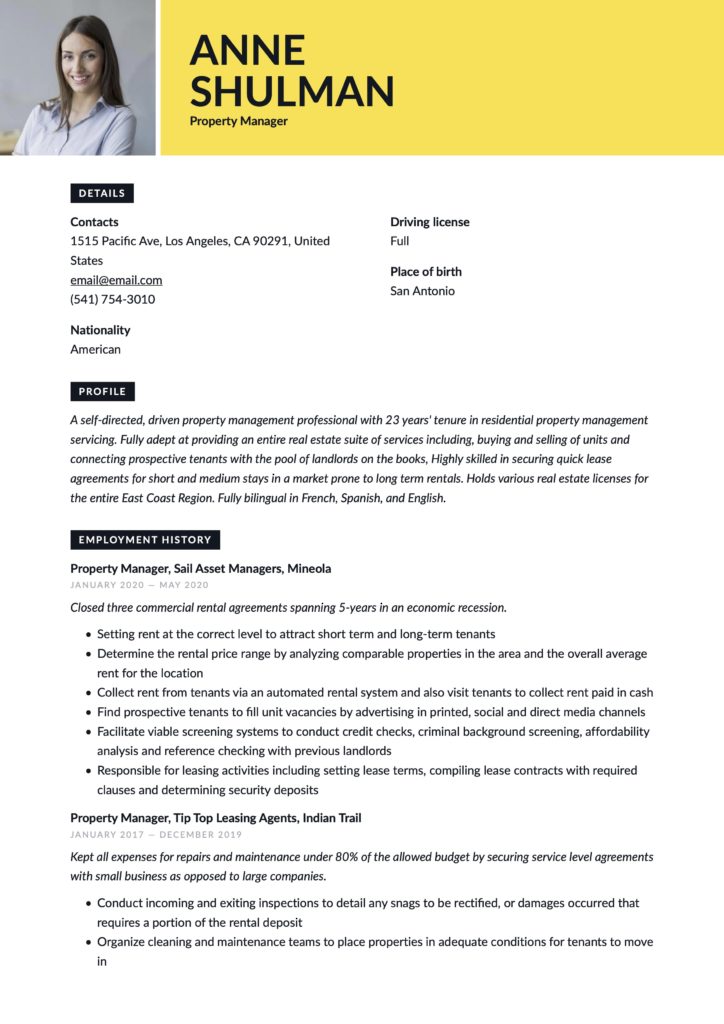
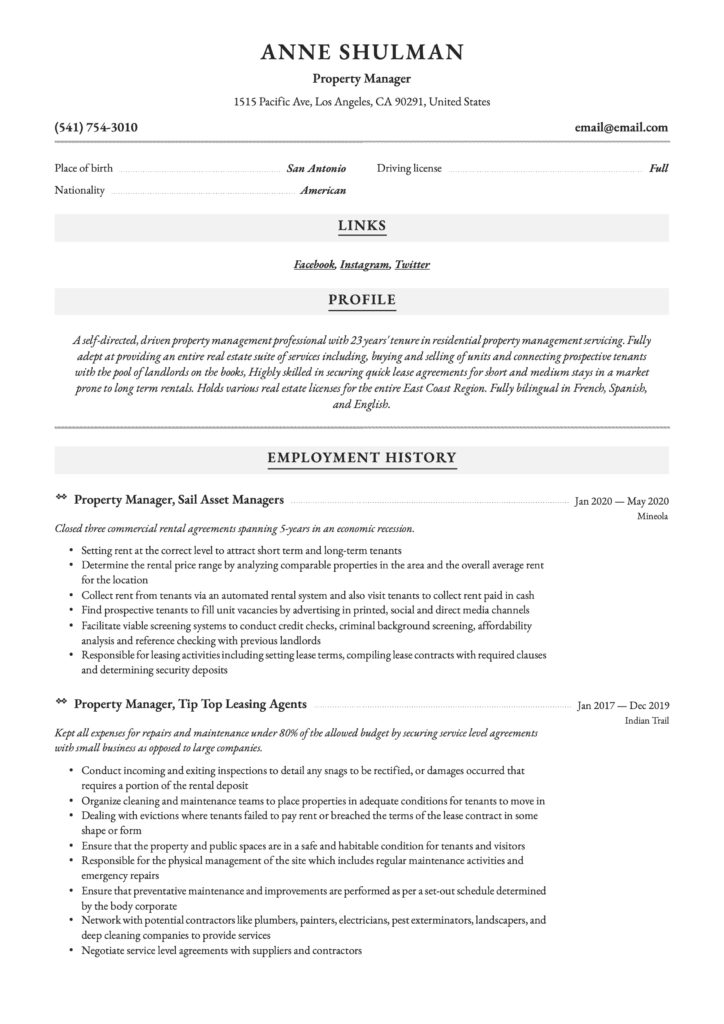
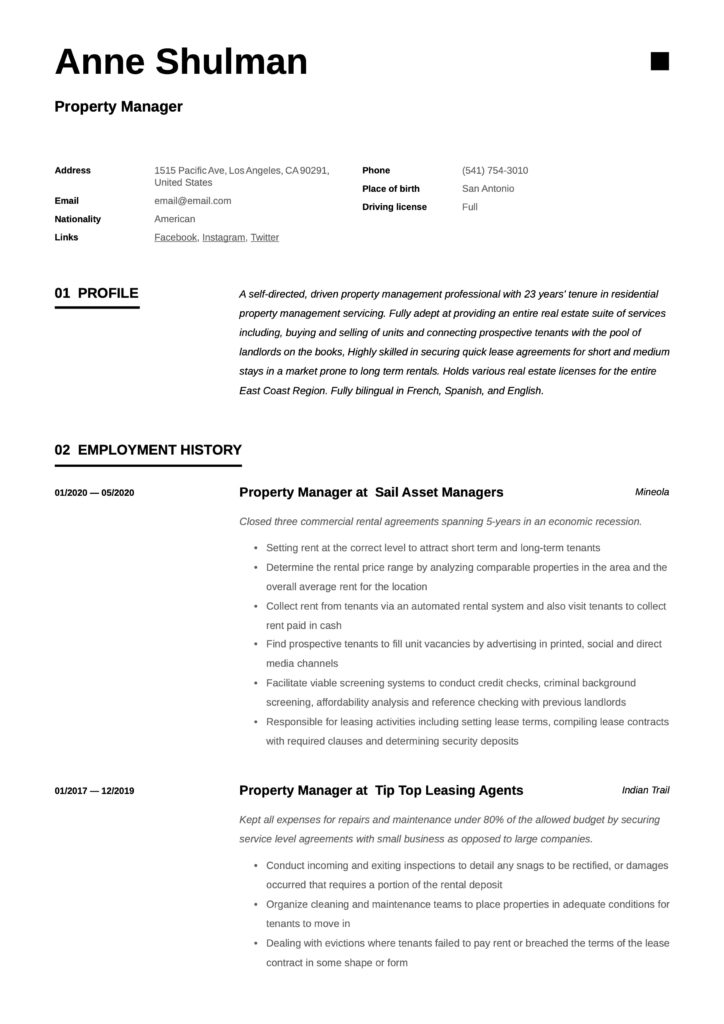
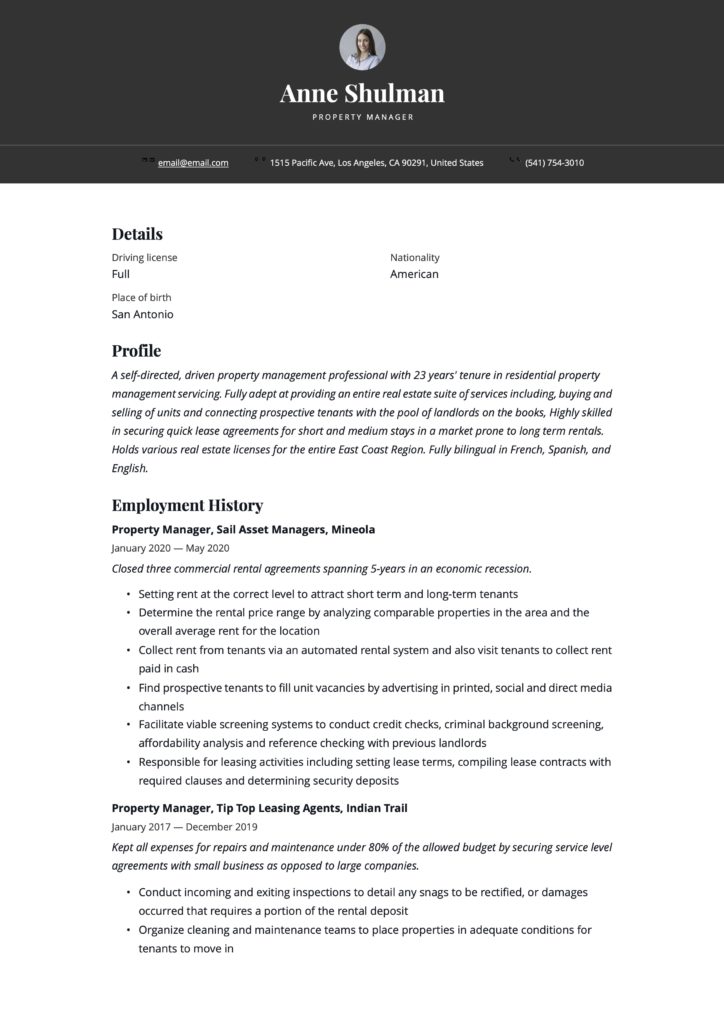
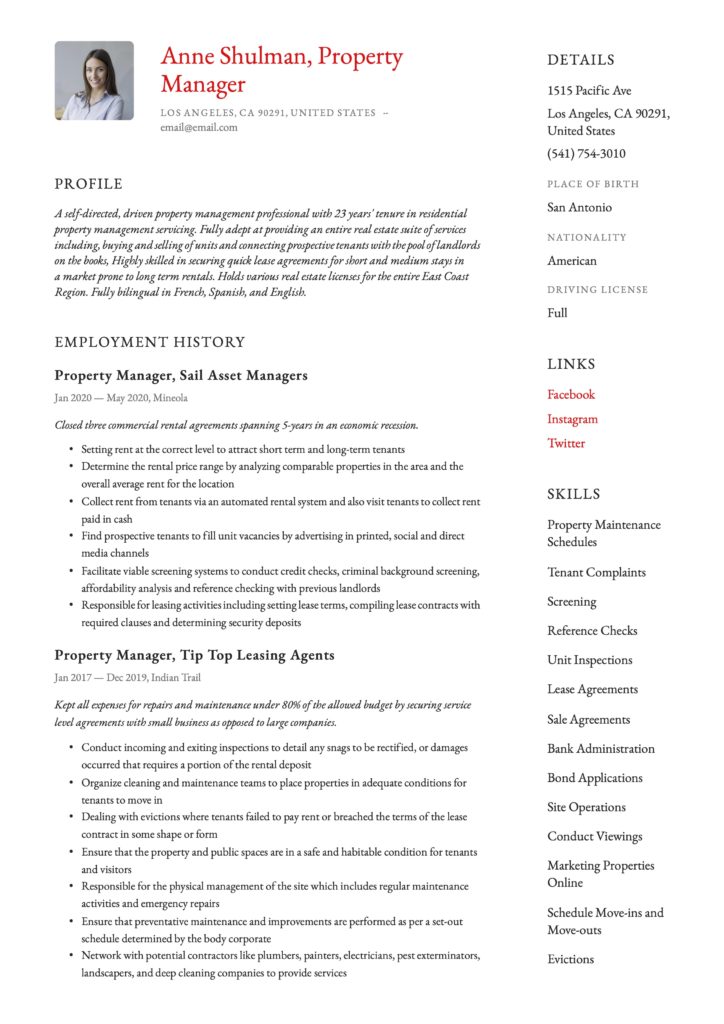
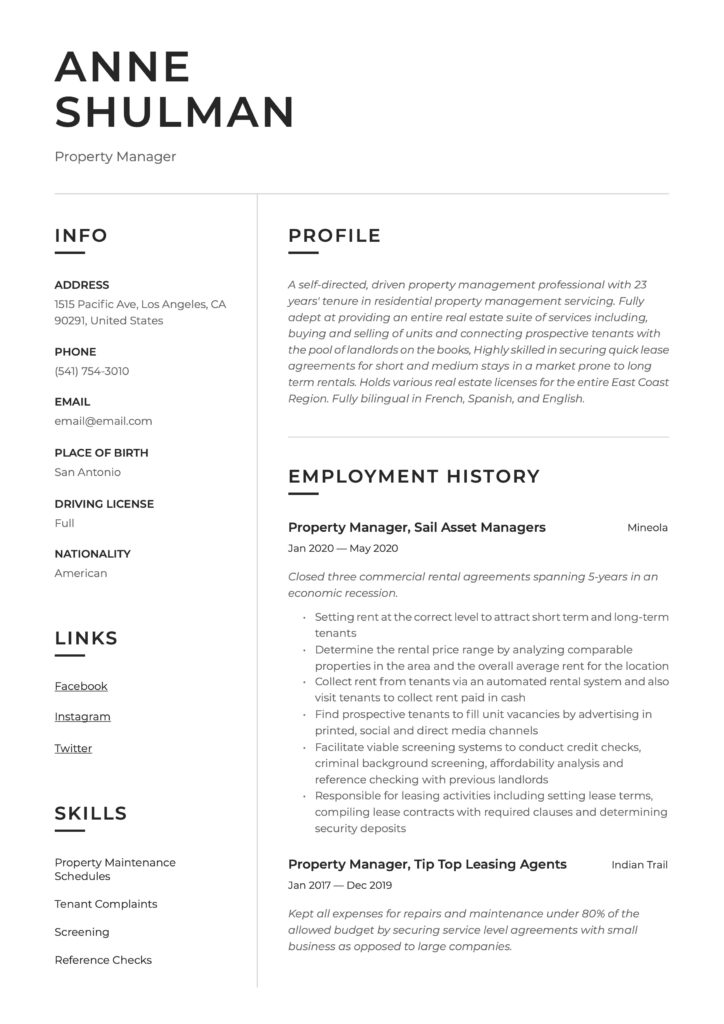
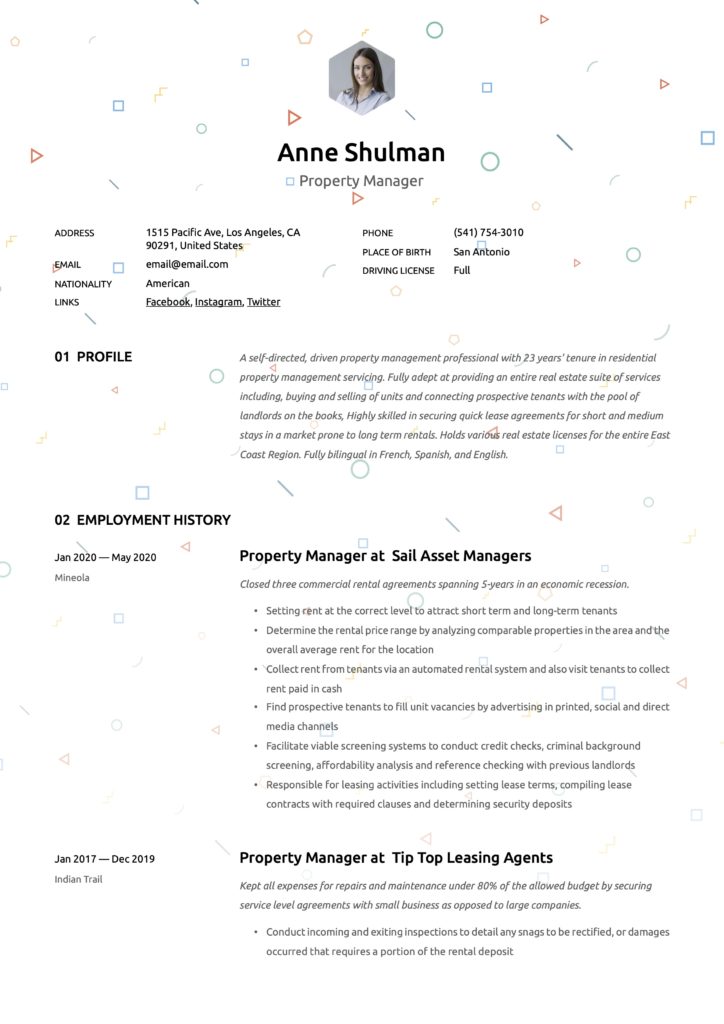


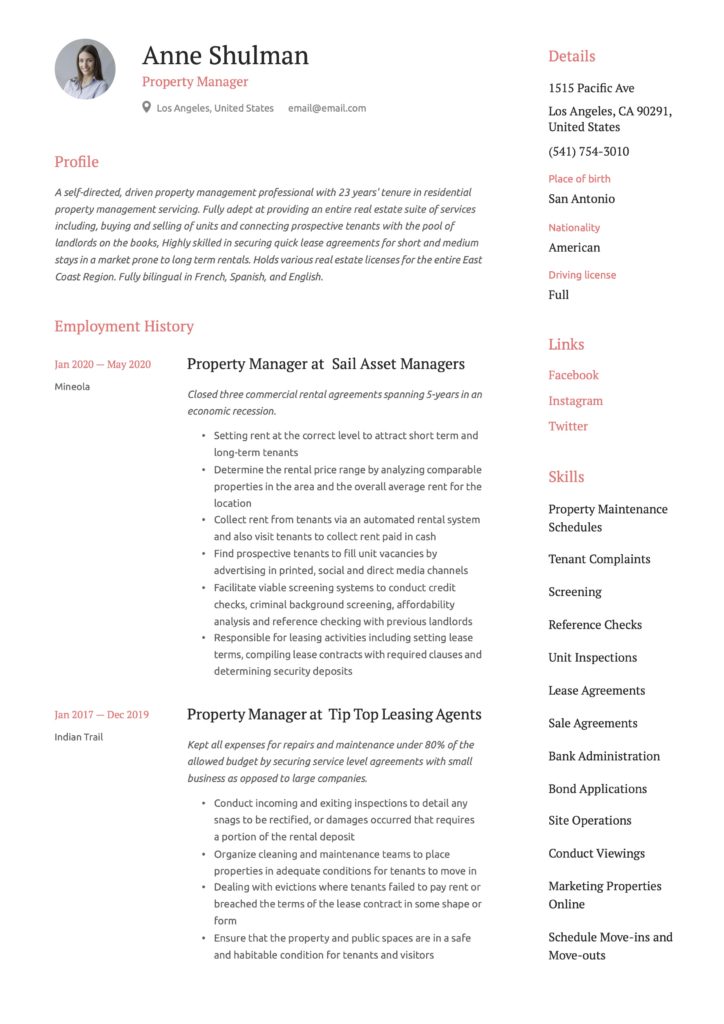
The Property Manager Resume Guide:
1. Resume Sections
1. Contact Information:
- Name
- Address
- Phone
- You need to be contactable via social media, too, therefore include Messenger, Whatsapp, Facebook, and Twitter details.
2. Career Summary:
View this as your showcase paragraph providing a teaser of what the reader may expect for the rest of your resume. Provide a 3-6 line paragraph, explaining the main purpose of your job and how you would add value to the role with specialist skills and technical competencies. Also includes the most recent academic credentials and licensing attained.
3. Qualifications Summary:
Most employers prefer Property Managers to have college degrees, especially if part of the role involves dealing with finances, contracts, advertising, and marketing. Bachelor Degrees typical to this field include Business Administration, Marketing, Real Estate Management, or Accounting. List academic credentials in reverse chronological order with the most recent qualification first.
4. Relevant Property Management Experience:
Hiring Managers and Recruiters are not interested in paging through pages and pages of job duty lists. Stick to a maximum of five duties per employer and only list job history for the last ten years. Employers would like to see experience that reflects that of the job description, your real estate administration competencies, tenant networking activities, and numerical proof of occupancy rates, properties sold, and properties managed. Make sure to include industry keywords and terminologies that relate to your industry, for example, industrial, residential, or commercial property management.
5. Other Employment Experience:
If you do not have property management experience yet, your other employment credentials may still come in handy if you tailor those job descriptions to includes duties that may be transferred easily onto a property management role.
6. Skills Summary/Key Skills:
Be sure to weave keyword from the job advertisement into all areas of your resume, for example, career summaries, job descriptions, accomplishment statements, and skills sections. This adds a report and credibility to your resume.
7.Education/Licenses/Certifications/Relevant/Coursework/Training:
Managers of single properties or apartment buildings are not required to have college degrees, but certification and licensing remain essential regardless of your formal academic credentials. State licensing is required if you are buying and selling properties. If your focus lies on tenant and rental management, you need to have real estate certification and be a member of the Real Estate Association in your region.
2. What to Highlight in a Property Manager Resume
Regardless of your experience as a Property Manager, there are a few vital topics that employers and recruiters would expect to see mentioned on your resume.
First up, provide industry context. There are many different types and settings of property management, which you may define from the kind of building facilities you are responsible for or the focus areas of property management services provided. Below we have summarized them into chewable paragraphs for you to select and customize the ones appropriate to your working environment.
Self-Storage Management requires a Property Manager to run daily operations of self-storage facilities. You may elaborate on tasks such as implementing of policies and procedures, pricing and fee agreements, financial administration, and also hiring and management of staff.
Commercial Property Management entails direct overseeing of land, sites, or buildings that are used for generating income and profits. You can explain to readers of you manage office buildings, retail malls, warehouses, or even industrial properties like factories and manufacturing plants. Be sure to include your functional responsibility, be it facilities management (utilities, water, gardens, cleaning) or administrative management (leases, tenants, advertising).
Recreational Property Management is typically seen as a fun and glamorous industry. What could be more fun than managing the daily maintenance and facilities or a resort on an island paradise, right? However, these roles are often a 24/7 on standby kind of gig, where you will be responsible for maintenance and logistics regarding site amenities, training of cleaning, operations, and logistic staff, finance, administration, and also advertising and promotions.
Residential Property Management entails the facilitation of residential property regarding buying and selling of building assets, including all the administrative transactions surrounding such transactions. You may also be involved in rental operations where recruiters would want to know your methodologies in generating prospective tenant pools, finding vacant properties to rent out, dealing with maintenance issues, and be the go-between for tenants, owners, and landlords alike.
Next comes the targets, goals, and production metrics that you need to achieve. Make sure to explain these in numeric terms, for example, size of facilities under your supervision, tenant occupancy rates, marketing and networking events, or properties sold. This strategy is called quantification of your resume (more on this later).
Employers and business owners in the property management industry are incredibly budget-conscious. Prove your financial adeptness by providing information on the size of budgets being entrusted to you and your decision- making level on approval for expenses such as repairs, maintenance, supplies, or marketing and advertising fees.
Also, the job of a Property Manager may be varied determined by industry and service specialty; there are a few primary duties that should be discussed in every Property Manager Resume
Financial Operations which may include tax payments, payroll, credit agreements, and maintenance bills. Collecting rent, deposits and managing trusts accounts for deposits and transfer fees are also part of the financial activities in property management.
Daily Operations could entail keeping facilities clean, doing reactive and preventative repairs, ensuring the upkeep of gardens and public areas, and making sure that tenants, visitors or shoppers adhere to the house rules and are protected by adequate health and safety protocols.
Marketing and Promotions are crucial to the real estate industry, and you can explain the extent of your role in this regard, for example, social media advertising, doing webinar Q&A’s for prospective buyers, conducting viewings to potential buyers or tenants or working with ad agencies to create written and digital marketing materials.
Real Estate Transactions involve the activities related to buying and selling of properties, securing lease agreements, assisting with loan or mortgage agreement applications, settling HOA fees, and handling transfer fees in conjunction with attorneys.
3. How to Write a Property Manager Career Objective
Executive Managers, CEOs, Company Owners, or Directors are the typical hiring managers that would be reviewing your application. They have volumes of resumes to go through and very little time to do so. Make their lives easier by dishing out a stellar career synopsis telling them who you are, what you have done, how you can add value, and the extent of your academic credentials and certifications.
All of this should be done in one paragraph of about 3 to 6 sentences, which creates a positive impression of your property management candidacy. Use flowery language and personal adjectives sparingly. The summary should be concise but informative and interesting to hook someone's immediate interest.
Three Examples of Property Manager career summaries:
Career Summary 1:
“Enthusiastic and diligent Property Manager with six years of experience in managing commercial and industrial real estate facilities achieving a minimum occupancy rate of 95% for the last three years. Overseeing facilities as large as 2 million square feet, and responsible for budgets of up to 10 million dollars per year. Certified member of the California Real Estate Association and completed an MBA with honors while holding a full-time position.“
Career Summary 2:
“A self-directed, driven property management professional with 23 years' tenure in residential property management servicing. Fully adept at providing an entire real estate suite of services including, buying and selling of units and connecting prospective tenants with the pool of landlords on the books, Highly skilled in securing quick lease agreements for short and medium stays in a market prone to long term rentals. Demonstrated competence to optimize real estate management activities by using digital tools for marketing, proposition, and transactional activities reducing time to fill and sales cycles significantly. Holds various real estate licenses for the entire East Coast Region. Fully bilingual in French, Spanish, and English.“
Career Summary 3:
“Diligent Property Manager with ten years working tenure in managing tenant and Vendor Relations, ensuring smooth facilitation of contract administration, and leading a team of 30 plus property management consultants. Hands-on experience in handling distressed and leased up property transactions with empathy and poise, being the liaison between customers in financial distress and auction companies. Known for accurate property evaluation and market forecasts providing realistic advice to tenants and landlords alike. Completed a Bachelors Degree in Real Estate Management and holds various Real Estate licenses to operate across the entire New England area.“
4. Job Descriptions, Responsibilities and Duty Examples
An employer would expect to see proven foundational duties and skillsets in a Property Manager's resume. In the job description below, we have provided a list of comprehensive duties to accommodate most Property Management activities. Pick the ones most suitable to your experience and customize them if you want or use them as-is.
Property Manager Job Description:
Rent
- Setting rent at the correct level to attract short-term and long-term tenants
- Determine the rental price range by analyzing comparable properties in the area and the overall average rent for the location
- Collect rent from tenants via an automated rental system and also visit tenants to collect rent paid in cash
- Strictly enforce penalty fees for late payments or rent overdue
- Adjust rental prices on a 12month or 6month basis by either increasing or decreasing amounts payable per market conditions and municipal laws and regulations
Managing Tenants
- Find prospective tenants to fill unit vacancies by advertising in printed, social and direct media channels
- Facilitate viable screening systems to conduct credit checks, criminal background screening, affordability analysis and reference checking with previous landlords
- Responsible for leasing activities including setting lease terms, compiling lease contracts with required clauses and determining security deposits
- Responsible for complaints and emergencies regarding maintenance issues, noise complaints, problems with utilities like power and water, as well as relevant emergencies
- Handling move-outs and move-ins as per regulations and real estate industry protocols
- Conduct incoming and exiting inspections to detail any snags to be rectified, or damages occurred that requires a portion of the rental deposit
- Organize cleaning and maintenance teams to place properties in adequate conditions for tenants to move in
- Dealing with evictions where tenants failed to pay rent or breached the terms of the lease contract in some shape or form
Maintenance and Repairs
- Ensure that the property and public spaces are in a safe and habitable condition for tenants and visitors
- Responsible for the physical management of the site which includes regular maintenance activities and emergency repairs
- Ensure that preventative maintenance and improvements are performed as per a set-out schedule determined by the body corporate
- Network with potential contractors like plumbers, painters, electricians, pest exterminators, landscapers, and deep cleaning companies to provide services
- Negotiate service-level agreements with suppliers and contractors
Supervisory Functions
- Manage employees on-site such is gardeners, concierges, security personnel and cleaners
- Responsible for looking after vacant properties to prevent vandalism and perform routine maintenance
Finance & Recordkeeping
- Managing budgets within set frameworks determined by the HOA or Real Estate Management Company
- Approve emergency repairs or maintenance as per the scope of approval set out by the management company
- Keep accurate records of all incidents or accidents for insurance purposes
- Track and record all income and expenses
- Keep an updated list of all incoming and outgoing inspections, repair and maintenance costs, insurance costs and monthly rental collections
5. Highlight Your Accomplishments
Under your accomplishment section, you may be tempted to copy and paste the list of duties you performed as detailed in your job description. Unfortunately, this approach will probably have your resume land up in the deleted pile of applications.
Accomplishments are your microphones for proving the value-adding activities or contributions you have made to organizations during your career. Also, remember to assign a separate section for accomplishment statements.
Present achievements and accolades in measurable terms that quantify your value to prospective companies.
When writing your accomplishment statements, see if you can answer the questions, “How much?” or “How many?” or “How often?”
Let's consider a few examples:
- Closed three commercial rental agreements spanning 5-years in an economic recession
- Assisted over 100 tenants in one month to find appropriate rental accommodation
- Kept all expenses for repairs and maintenance under 80% of the allowed budget by securing service-level agreements with small businesses as opposed to large companies
- Successfully implemented an online screening and background checking system which reduced screening and tenant onboarding time by two weeks
- Embarked on innovative digital viewing activities which meant that in-person viewings were reduced, and properties sold up to 10 days quicker than normal
6. Property Manager Education Section Example
The education section is an integral part of your resume application. Be sure to include all formal qualifications as well as certifications and licensing related to the real estate industry.
To maintain licensing, Property Managers are also expected to participate in frequent training programs and Continuous Professional Development (CPD) courses.
Display credentials by date completed, name of institution, qualification, and course curriculums. Also, include relevant licenses and industry memberships.
A Property Manager’s education section example:
2020 – Current Masters in Business Administration, Chicago Business University, Chicago, IL
2019 – Certified Manager (CM), Institute of Certified Professional Managers, Reston, VA
2018 – Full Member, The Community Associations Institute, Miami, FL
2017 – Certified Property Manager, New York Real Estate School, Manhattan, NY
2016 – Licensed Realtor Membership, National Association of Realtors, Online
2015 – Certified Manager of Community Associations (CMCA), National Board of Certification, Online
2014 – Large Scale Manager (LSM), Professional Community Association Manager (PCAM), Tampa, FL
2012-2014 Bachelor's Degree in General Management, University of Denver, Denver, CO
7. What to Write in a Property Manager Resume Skills Section
Although the property management field requires specific technical skills, employers also look for other skills, called soft skills. Both are important because they indicate to recruiters and hiring managers whether you are a fit for the role at hand.
Use a Skills Matrix formats to present them appropriately:
8. Property Management Skills
| Property Maintenance Schedules | Bond Applications | Renewals | Security Deposits |
| Tenant Complaints | Site Operations | Occupancy Rates | Record keeping |
| Screening | Conduct Viewings | Social Media Platforms | Income & Expenses Allocations |
| Reference Checks | Marketing Properties Online | Create Advertisements | Budgets |
| Unit Inspections | Schedule Move-ins and Move-outs | Interview Tenants | Distribute Payments |
| Lease Agreements | Evictions | Emergency Repairs | Collection Systems |
| Sale Agreements | Facilities Management | Building Improvements | Credit Agreements |
| Bank Administration | Utility Management | Mortgage Applications | Commercial Applications |
9. Soft Skills
| Leadership | Meticulous | Multi-Tasking |
| Deadline Driven | Reliable | Task Orientated |
| Initiative | Collaboration | Strategic Scope |
| Integrity | Self-Control | Realistic |
| Attention to Detail | Empathy | Critical Thinking |
| Decision Making | Time Management | Persuasion |
10. Qualifications/Certifications associated with Property Managers
| Building Owners and Managers Association (BOMA) | Professional Housing Consultant (PHC) | National Apartment Leasing Professional (NALP) |
| Real Property Administrator (RPA) | Accredited Commercial Manager (ACoM) | Accredited Management Organization (AMO) |
| Facilities Management Administrator (FMA) | Association Management Specialist (AMS) | Accredited Residential Manager (ARM) |
| Systems Maintenance Administrator (SMA) | Association Management Specialist (AMS) | Certified Manager of Community Associations (CMCA) |
| Systems Maintenance Technician (SMT) | Residential Management Professional (RMP) | Certified Apartment Manager (CAM) |
| Certified Property Manager (CPM) | Certified Apartment Manager (CAM) | Certified Manager of Community Associations (CMCA) |
11. Professional information of Property Managers
Sectors: Real Estate, Property, Asset Management,
Career Type: Operations, Business Management, Team Dynamics
Person type: Leader, Motivator, Coach, Director
Education levels: Bachelor's Degree or Post School Certifications
Salary indication: Average Base Pay is $53,683/year (Glassdoor)
Labor market: Estimated 7% between 2018 and 2028
